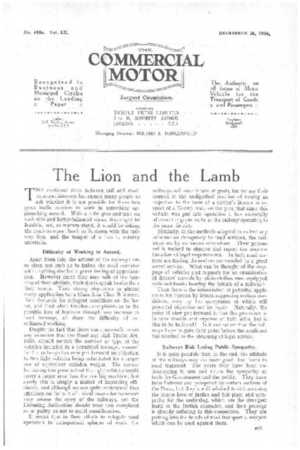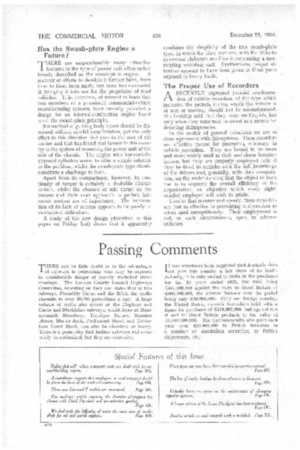The Lion and the Lamb
Page 23

Page 24

If you've noticed an error in this article please click here to report it so we can fix it.
THE continual strife between. rail and roadtransport interests has caused many people to ask whether it is not possible for these two great traffic carriers to work in something approaching accord. With a little give-and-take on each side and better-balanced views, this might be' feasible, but, as matters stand, it would be asking the road-transport lamb to lie down with the railway lion, and the temper of a lion is notably uncertain.
Difficulty of Working in Accord.
Apart from this, the actions of the railways are so often not such as to imbue the road operator with anything else but a grave feeling of apprehension. However much they may talk of the fairness of their attitude, their deeds speak louder than their words. Their strong objections to almost every application for a Class A or Class B licence, their demands for stringent conditions on the latter, and their often frivolous complaints as to the possible loss of. business through any increase in road tonnage, all show thedifficulty of coordinated working.
Despite the fact that there was apparently never any intention that the Road and Rail Traffic Act, 1933, should restrict the number or type of the vehicles included in a permitted tonnage, counsel for the railways has now put forward an objection to two light vehicles being substituted for a larger one of equivalent unladen weight. The excuse for raising this point is that the light vehicles would cover a larger area than the one big machine ; but surely this is simply a matter of increasing efficiency, and although we can quite understand that efficiency on the part of a rival means for transport may arouse the envy of the railways, yet the Licensing Authorities should treat this complaint as so paltry as not to merit consideration.
. It seems that in their efforts to relegate road operators to unimportant spheres of work, the railways will even strain at gnats, for we see their counsel in the undignified position of raising an objection to the issue of a carrier's licence in respect of a 7i-cwt. van, on the plea that since this vehicle was put into operation it has materially affected the grain traffic of the railway operating in the same district.
Similarly, in the methods adopted to collect any information derogatory to road services, the railways are by no means scrupulous. Their personnel is trained to observe and report the smallest breaches of legal requirements. In fact, road carriers are finding themselves surrounded by a great secret service. What can be thought of the stoppage of vehicles and requests for an examination of drivers' records by plain-clothes men equipped with notebooks bearing the initials of a railway?
Then there is the intimidation of potential applicants for licences by letters suggesting certain conditions, only by the • acceptance of which will powerful objection not be made. Naturally, the point of view put forward is that this procedure is to save trouble and expense on both sides, but is this to be believed? Is it not rather that the railways hope to gain their point before the applicant has resorted to the obtaining of legal advice?
Railways Risk Losing Public Sympathy.
It is quite possible that, in the end, the attitude of the railways may do more good than harm to road transport. For years they have been endeavouring to win and retain the sympathy of both the Government and the public. They have been flattered and pampered by certain sections of the Press, but they are ill advised to risk arousing the innate love of justice and fair play, and sympathy for the underdog, which are the strongest traits of the British character, and their prestige is already suffering in this connection. They are putting into the hands of road transport a weapon which can be used against them.
Has the Swash-plate Engtne a Future ?
THERE are unquestionably many attractive features in the type of power unit often rather loosely described as the swash-plate engine. A number of efforts to develop it further have, from time to time, been made, but none has succeeded in bringing it into use for the propulsion of road vehicles. It is, therefore, of interest to learn that two members of a prominent commercial-vehicle manufacturing concern have recently patented a design for an internal-combustion engine based upon the swash-plate principle.
No method of gaining body space should be dismissed without careful consideration, yet the only effort in this direction that goes to the root of the matter and that has found real favour in this country is the system of mounting the power unit at' the side of the chassis. The engine with horizontally opposed cylinders seems to offer a simple solution to the problem. whilst the swash-plate type should constitute a challenge to both.
Apart from its compactness, however, its continuity of torque is certainly a desirable characteristic, whilst the absence of side thrust on the pistons and their near approach N perfect harmonic motion are of importance. The explanation of its lack of success appears to lie purely in mechanical difficulties.
A study of the new design (described in this paper on Friday last) shows that it apparently combines the simplicity of the true swash-plate type, in which the plate revolves, with the hitherto somewhat elaborate machine incorporating a non rotating wobbling unit. Furthermore, proper attention appears to have been given to those parts exposed to heavy loads.
The Proper Use of Recorders
ARECENTLY expressed judicial condemnation of vehicle recorders. of the type which indicates the periods during which the vehicle is at rest or moving, should not be misunderstood. His lordship said that they were un-English, but only when they were used in secret as a means for detecting delinquencies.
In the matter of general principles we are in close agreement with this opinion. These recorders are effective means for promoting efficiency in vehicle ,operation. They are bound to be more and more widely used as their usefulness becomes known, but they are properly employed only if they be fitted to vehicles with the full knowledge of the drivers and, generally, with their co-operation, on the understanding that the object of their use is to improve the overall efficiency of the organization, an objective Which every rightminded employee will wish to attain. Used in that manner and openly, these recorders are just as effective in preventing malpractices as when used surreptitiously. Their employment is not, in such circumstances, open to adverse criticism.




















































































